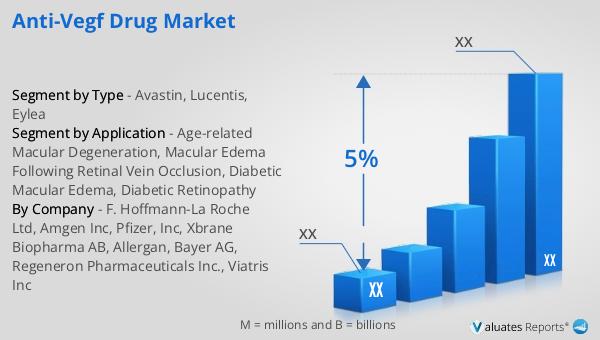What is Global Anti-VEGF Drug Market?
The Global Anti-VEGF Drug Market refers to the worldwide market for drugs that inhibit Vascular Endothelial Growth Factor (VEGF). VEGF is a protein that promotes the growth of new blood vessels, a process known as angiogenesis. While angiogenesis is essential for normal bodily functions, excessive VEGF activity can lead to diseases characterized by abnormal blood vessel growth, such as certain types of cancer and eye diseases. Anti-VEGF drugs work by blocking the action of VEGF, thereby inhibiting the formation of these abnormal blood vessels. These drugs are primarily used in the treatment of various eye conditions, including Age-related Macular Degeneration (AMD), Diabetic Retinopathy, and Macular Edema. The market for these drugs is expanding due to the increasing prevalence of these conditions, advancements in drug formulations, and growing awareness about the benefits of early treatment. Major players in this market include pharmaceutical giants like Roche, Novartis, and Regeneron, who produce well-known anti-VEGF drugs such as Avastin, Lucentis, and Eylea. The market is characterized by intense competition, ongoing research and development, and a strong focus on improving patient outcomes through innovative therapies.

Avastin, Lucentis, Eylea in the Global Anti-VEGF Drug Market:
Avastin, Lucentis, and Eylea are three prominent drugs in the Global Anti-VEGF Drug Market, each playing a crucial role in treating various eye conditions. Avastin (bevacizumab), developed by Genentech, a subsidiary of Roche, was initially approved for treating certain types of cancer. However, it has been widely used off-label for treating eye diseases like AMD due to its cost-effectiveness compared to other anti-VEGF drugs. Lucentis (ranibizumab), also developed by Genentech and marketed by Novartis outside the U.S., is specifically designed for ocular use. It has been approved for treating AMD, Diabetic Macular Edema (DME), and other retinal diseases. Lucentis works by binding to VEGF-A, a key protein involved in the formation of abnormal blood vessels in the eye, thereby preventing vision loss. Eylea (aflibercept), developed by Regeneron and marketed by Bayer outside the U.S., is another significant player in this market. Eylea is approved for treating AMD, DME, and Macular Edema following Retinal Vein Occlusion (RVO). It acts by trapping VEGF-A and another related protein, PlGF, thus inhibiting the growth of abnormal blood vessels and reducing fluid leakage in the eye. Each of these drugs has its unique mechanism of action, dosing regimen, and efficacy profile, making them suitable for different patient needs and preferences. The competition among these drugs has led to continuous improvements in treatment protocols, patient outcomes, and overall market growth. Despite their differences, all three drugs share the common goal of preserving vision and improving the quality of life for patients suffering from debilitating eye conditions.
Age-related Macular Degeneration, Macular Edema Following Retinal Vein Occlusion, Diabetic Macular Edema, Diabetic Retinopathy in the Global Anti-VEGF Drug Market:
The Global Anti-VEGF Drug Market plays a vital role in treating several eye conditions, including Age-related Macular Degeneration (AMD), Macular Edema Following Retinal Vein Occlusion (RVO), Diabetic Macular Edema (DME), and Diabetic Retinopathy. AMD is a leading cause of vision loss in older adults, characterized by the deterioration of the central portion of the retina. Anti-VEGF drugs like Lucentis and Eylea are commonly used to treat wet AMD, where abnormal blood vessels grow under the retina and leak fluid or blood, leading to vision loss. By inhibiting VEGF, these drugs help reduce the growth of these abnormal vessels and prevent further damage to the retina. Macular Edema Following RVO occurs when a blockage in the retinal veins leads to fluid accumulation in the macula, the central part of the retina responsible for sharp vision. Anti-VEGF drugs like Eylea are effective in reducing this fluid buildup, thereby improving vision. Diabetic Macular Edema (DME) is a complication of diabetes that results in swelling of the macula due to leaking blood vessels. Anti-VEGF drugs such as Lucentis and Eylea are used to treat DME by reducing the leakage and swelling, thus preserving vision. Diabetic Retinopathy, another diabetes-related condition, involves damage to the blood vessels in the retina, leading to vision impairment. Anti-VEGF drugs help manage this condition by inhibiting the growth of new, abnormal blood vessels and reducing inflammation. The use of these drugs in treating these conditions has revolutionized the management of retinal diseases, offering hope to millions of patients worldwide. The effectiveness of anti-VEGF therapy in preserving vision and improving the quality of life underscores the importance of continued research and development in this field.
Global Anti-VEGF Drug Market Outlook:
The global pharmaceutical market was valued at approximately 1,475 billion USD in 2022 and is projected to grow at a compound annual growth rate (CAGR) of 5% over the next six years. In comparison, the chemical drug market saw an increase from 1,005 billion USD in 2018 to an estimated 1,094 billion USD in 2022. This growth highlights the expanding demand for pharmaceutical products and the significant role that chemical drugs continue to play within the broader pharmaceutical landscape. The steady growth rate of the pharmaceutical market reflects ongoing advancements in medical research, the development of new therapies, and the increasing prevalence of chronic diseases that require long-term medication. The chemical drug market, while growing at a slightly slower pace, remains a critical component of the pharmaceutical industry, driven by the need for effective treatments for a wide range of health conditions. The data underscores the dynamic nature of the pharmaceutical sector and the continuous efforts to meet the evolving healthcare needs of the global population.
| Report Metric | Details |
| Report Name | Anti-VEGF Drug Market |
| CAGR | 5% |
| Segment by Type |
|
| Segment by Application |
|
| Consumption by Region |
|
| By Company | F. Hoffmann-La Roche Ltd, Amgen Inc, Pfizer, Inc, Xbrane Biopharma AB, Allergan, Bayer AG, Regeneron Pharmaceuticals Inc., Viatris Inc |
| Forecast units | USD million in value |
| Report coverage | Revenue and volume forecast, company share, competitive landscape, growth factors and trends |
